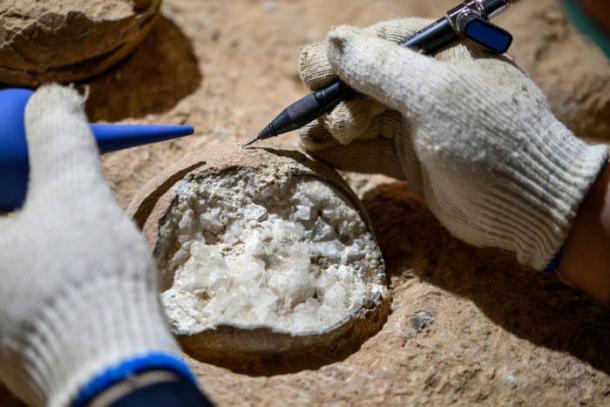Science
Scientists Date Dinosaur Eggs at 85.91 Million Years Old

Researchers in China have made a significant advancement in paleontology by accurately dating dinosaur eggs for the first time. The eggs, discovered at the Qinglongshan site in Hubei Province, have been dated to approximately 85.91 million years old. This groundbreaking achievement not only enhances our understanding of dinosaur evolution but also sheds light on climate changes during the Late Cretaceous period.
The study, published in the journal Frontiers, utilized a novel “atomic clock” dating method. This approach allows scientists to determine the age of fossils with unprecedented precision. The eggs belong to the species Placoolithus tumiaolingensis, which offers valuable insights into a critical era characterized by significant climatic shifts that may have influenced dinosaur extinction patterns.
Innovative Techniques Lead to New Discoveries
The research team, led by paleontologist Bi Zhao, carefully examined a clutch of 28 eggs at the site. Most of the specimens were identified as Placoolithus tumiaolingensis, contributing to a growing body of evidence regarding the reproductive behavior and development of dinosaurs during this period. The use of atomic clock technology marks a pivotal moment in the field, allowing for a more accurate timeline of dinosaur history.
Previously, dating dinosaur eggs has relied on indirect methods, often leading to uncertainties regarding their ages. The atomic clock technique, however, can provide direct measurements that enhance the reliability of the data. This innovation is expected to open new avenues for research, potentially revealing more about the environmental conditions dinosaurs faced millions of years ago.
Implications for Understanding Climate Change
The findings from the Qinglongshan site not only contribute to paleontology but also have broader implications for understanding historical climate changes. The Late Cretaceous period was marked by dramatic cooling, a factor believed to have played a role in the decline of dinosaur populations. By studying these eggs, scientists can gain insights into how such environmental shifts affected the life cycles and habitats of these ancient creatures.
As the research community continues to explore the implications of this breakthrough, the dating of the 85.91 million-year-old eggs reinforces the importance of integrating advanced technologies in the study of Earth’s prehistoric life. This advancement could lead to further discoveries that deepen our understanding of the complex interplay between climate and evolution.
In conclusion, the successful dating of the dinosaur eggs at the Qinglongshan site represents a significant leap forward in paleontological research. As scientists continue to unravel the mysteries of our planet’s past, the insights gained from this study will undoubtedly contribute to a more comprehensive understanding of dinosaur history and the climatic challenges they faced.
-

 Top Stories3 days ago
Top Stories3 days agoTributes Surge for 9-Year-Old Leon Briody After Cancer Battle
-

 Entertainment2 months ago
Entertainment2 months agoAimee Osbourne Joins Family for Emotional Tribute to Ozzy
-

 Politics2 months ago
Politics2 months agoDanny Healy-Rae Considers Complaint After Altercation with Garda
-

 Top Stories2 days ago
Top Stories2 days agoNewcastle West Woman Patricia Foley Found Safe After Urgent Search
-

 Sports1 day ago
Sports1 day agoConor Murray Reflects on His Career in New Autobiography
-

 Top Stories1 month ago
Top Stories1 month agoIreland Enjoys Summer Heat as Hurricane Erin Approaches Atlantic
-

 World2 months ago
World2 months agoHawaii Commemorates 80 Years Since Hiroshima Bombing with Ceremony
-

 Top Stories2 months ago
Top Stories2 months agoFianna Fáil TDs Urgently Consider Maire Geoghegan-Quinn for Presidency
-

 World2 months ago
World2 months agoGaza Aid Distribution Tragedy: 20 Killed Amid Ongoing Violence
-

 World2 months ago
World2 months agoCouple Convicted of Murdering Two-Year-Old Grandson in Wales
-

 Top Stories2 months ago
Top Stories2 months agoClashes Erupt Between Far-Right Groups and Migrants in Spain
-

 World2 months ago
World2 months agoAristocrat Constance Marten and Partner Convicted of Infant Murder








